
Guests
- Clyde Bellecourtco-founder and director of the American Indian Movement. He was a major figure in the occupation of Wounded Knee in 1973. Bellecourt is also an organizer with the National Coalition on Racism in Sports and the Media.
- Dave Zirinsports columnist for The Nation magazine and host of Edge of Sports Radio on SiriusXM. Zirin is the author of several books on sports, including, most recently, Game Over: How Politics Has Turned the Sports World Upside Down.
For decades, members of many American Indian communities have called on the Washington R-dsk-ns football team to change its name, which is based on a racial slur. Now the pressure has reached new heights. On Thursday night, nearly a thousand Native Americans and their allies protested outside the Metrodome Stadium in Minneapolis as the team played the Minnesota Vikings. Earlier in the day, Minnesota Gov. Mark Dayton suggested members of Congress put pressure on the team’s owners by boycotting its games. On Tuesday, D.C. lawmakers voted to call on the team to change its name. Also this week, the Minnesota American Indian Movement took legal action to call on the state to refuse funding for the new Vikings stadium if the word R-dsk-ns will be used there. Despite the massive outcry, the team’s owner, Daniel Snyder, has refused to change its name. “The 'R' word is not different than the 'N' word. Little Red Sambo has to go,” says Clyde Bellecourt, co-founder and director of the American Indian Movement and an organizer with the National Coalition on Racism in Sports and the Media. We are also joined by Dave Zirin, political sports columnist for The Nation magazine and host of Edge of Sports Radio. “The word R-dsk-ns is a legacy of Jim Crow. It’s a legacy of the team’s original owner, George Preston Marshall, who was an arch-segregationist,” Zirin notes. “The team was the last team to integrate in the NFL. When George Preston Marshall passed away in 1969, he put in his will that no money from his foundation could go to any organization that promoted [racial] integration.”
Transcript
JUAN GONZÁLEZ: For decades, members of many indigenous tribes have called on the Washington R-dsk-ns football team to change its name, which is based on a racial slur. Now the pressure has reached new heights. Thursday night, nearly a thousand Native Americans and their allies protested outside the Metrodome Stadium in Minneapolis as the team played the Minnesota Vikings. Earlier in the day, Minnesota Governor Mark Dayton suggested members of Congress put pressure on the team’s owners by boycotting its games. This came after Washington, D.C., lawmakers voted Tuesday to call on the team to change the name.
AMY GOODMAN: Meanwhile, Minneapolis’s mayor released a statement Thursday saying the name disrespects indigenous people, and this week six members of the Minneapolis City Council sent a letter to the team’s owner and NFL Commissioner Roger Goodell calling the nickname and team mascot racist. This groundswell of support comes as Bob Costas of NBC Sports spoke about the topic during half-time as he anchored a game when Washington’s team played last month.
BOB COSTAS: Objections to names like Braves, Chiefs, Warriors and the like strike many of us as political correctness run amok. These nicknames honor rather than demean. They’re pretty much the same as Vikings, Patriots or even Cowboys. And names like Blackhawks, Seminoles and Chippewas, while potentially more problematic, can still be OK, provided the symbols are appropriately respectful, which is where the Cleveland Indians, with the combination of their name and Chief Wahoo logo, have sometimes run into trouble.
A number of teams, mostly in the college ranks, have changed their names in response to objections. The Stanford Cardinal and the Dartmouth Big Green were each once the Indians. The St. John’s Redmen have become the Red Storm. And the Miami of Ohio R-dsk-ns—that’s right, R-dsk-ns—are now the Redhawks. Still, the NFL franchise that represents the nation’s capital has maintained its name.
But think for a moment about the term R-dsk-ns and how it truly differs from all the others. Ask yourself what the equivalent would be if directed toward African Americans, Hispanics, Asians or members of any other ethnic group. When considered that way, R-dsk-ns can’t possibly honor a heritage or a noble character trait, nor can it possibly be considered a neutral term. It’s an insult, a slur, no matter how benign the present-day intent. It’s fair to say that for a long time now, and certainly in 2013, no offense has been intended. But if you take a step back, isn’t it clear to see how offense might legitimately be taken?
JUAN GONZÁLEZ: That was NBC Sports anchor Bob Costas speaking at half-time during a game last month in which Washington’s team played. This week, the Minnesota American Indian Movement took legal action to call on the state to refuse funding for the new Vikings Stadium if the word “R-dsk-ns will be used there. Despite the massive outcry, the team’s owner, Dan Snyder, has refused to change its name. During an interview with USA Today, Snyder said, quote, “We will never change the name of the team. … It’s that simple. NEVER. You can use caps.”
AMY GOODMAN: Well, for more, we go to Minneapolis, where we’re joined by Clyde Bellecourt, co-founder, director of the American Indian Movement, known as AIM. He was a major figure in the occupation of Wounded Knee 40 years ago in 1973. Bellecourt is also organizer with the National Coalition on Racism in Sports and the Media. AIM helped organize last night’s protest as part of the Change the Mascot movement.
And here in New York, we’re joined by Dave Zirin, sports columnist for The Nation magazine and host of Edge of Sports Radio on SiriusXM. One of his latest pieces is “Dump the R-dsk-ns’ Slur!” He’s also written about “The NFL’s Bully Problem,” which we’ll talk about in a moment.
First to Clyde Bellecourt, tell us what happened last night in Minneapolis.
CLYDE BELLECOURT: First of all, my traditional name, my spirit name given to me by the creator, is Nee-gon-we-way-we-dun, or the Thunder Before the Storm. But when I was born 77 years ago, I was not allowed—no Indian people were allowed—to have an Indian name. We couldn’t pray, sing, dance, carry on our traditional spiritual way of life.
Last night, as one of the monumental walk took place, from the heart of the Indian community in South Minneapolis, one of the largest concentrated Indian communities in America, over a thousand mostly Native people, some of them in their full regalia to show the beauty of our culture, went along with us, marched on the stadium, carrying banners that said, “The 'R' word is no different than the 'N' word.” “The 'R' word is no different than the 'N' word.” Little Red Sambo has to go. Little Black Sambo is gone, and now it’s time for Little Red Sambo to go.
It’s not really the names. It’s not just the names. It’s the behavior created when they get a little bit behind, you know, the Washington team or Cleveland, they start hollering “Scalp them f—in’ Twins!” “Scalp the Vikings! Massacre them!” And our children grab our arms—our nephews and nieces, our sons and daughters. “Come on, Dad. Come, Grandpa. Let’s go home. Let’s go home. Let’s get out of here.” It has a tremendous psychological effect on Indian people.
And if Dan Snyder knew where the word R-dsk-ns comes, truly understood it, I think he would make that change—a man knowing what a holocaust is and what genocide is. Goes all the way back to Governor Kalb [ phon. ] in Newfoundland in the 1500s. When they started their Western expansion, the Indian people were in their way, so he put out a bounty on Indian people. It was perfectly legal to kill Indians then. And they were bringing them in by the wagon loads. Women, who didn’t have any rights back then, and the church started speaking out about it. It became to cumbersome financially to bury them. So he said, to prove that you killed an Indian, now that’s all you had to do was bring in their skull. And they said they were bringing them in by gunny sacks, bushel baskets, bringing wagon loads to collect their bounties. The women spoke out again, put pressure, pressure on the governor, Kalb. And he said, “To prove you that you kill an Indian, that’s all you have to do now is bring in a lock of their hair.” So when they cut that scalp off the Indian people’s head, now they could go after little children, babies, and collect more money. That blood would run down their face, that red blood, and down their bodies. They’d put those pouches, the pouches on their leg, their scalps, and come in and collect their bounty. Henceforth, there’s been over 60 tribes that have been totally erased from the face of the Earth, no longer exist. And Dan Snyder should understand that, being Jewish himself. There are Jewish people still here, but there are tribes that have been totally decimated. And that’s where the word R-dsk-ns comes from. And we’e demanding that that change. The “R” word is no different than the “N” word, and Little Red Sambo has to go.
JUAN GONZÁLEZ: Dave, I wanted to ask you about the almost belligerent response of Dan Snyder to these calls for the change of the name. He tries—he claims that it’s honoring the tradition of the R-dsk-ns, that there were several Native Americans on the original first R-dsk-ns team and a Native American coach. But could you talk about his response—his particularly strong opposition to even considering a name change?
DAVE ZIRIN: Absolutely. First of all, Dan Snyder has been teaching a master class in anti-public relations. And he is one of the reasons why this has become such a big issue over the last six months. I mean, folks like Clyde Bellecourt, folks in the American Indian Movement have been working on this issue for decades, and yet in the last six months we’ve seen this massive sea change where all of a sudden folks like Bob Costas, Sports Illustrated's Peter King, USA Today's Christine Brennan are no longer using the word. It’s an amazing thing to have happen, to see this kind of progress. And Dan Snyder is one of three reasons why. I mean, Dan Snyder, when—every time he speaks about this issue, folks who want to change the name, they get more committed to doing it, and folks who would be likely to stand with Dan Snyder start to think to themselves, “Do I really want to stand with this guy?”
But there are a couple of other reasons, too, why we’ve seen such this—a tremendous sea change in activism around this. The first is the active and confident intervention of indigenous voices. I mean, starting with the Idle No More movement in Canada, I mean, you really have seen this upsurge in indigenous activism. And in this issue, in particular, the Oneida Nation in upstate New York, AIM, the Choctaw tribe, they have been very aggressive in saying, “Wait a minute, this has to go.”
The second reason is that the team itself is really relevant for the first time in 20 years. This name has been protected by the football team’s own mediocrity for decades. And yet they’ve been better recently. They have a star quarterback named Robert Griffin III. And that has turned the name into a national discussion.
And then the last reason is what you just said. Dan Snyder, every time he opens his mouth, it’s like King Midas in reverse: Everything he touches turns to whatever we would say on polite television is the opposite of gold.
AMY GOODMAN: This is president Obama weighing in on whether the Washington football team should change its name.
PRESIDENT BARACK OBAMA: Obviously, people get pretty attached to team names, mascots. You know, I don’t think there are any R-dsk-ns fans that mean offense. I’ve got to say, if I were the owner of the team, and I knew that there was a name of my team, even if it had a storied history, that was offending a sizable group of people, I’d think—I’d think about changing it.
AMY GOODMAN: So there is President Obama calling for changing it. And there’s a call for broadcasters not to use the name. I think Mother Jones talked about “red-acted.” What else, Dave Zirin, on those team names?
DAVE ZIRIN: Oh, well, it’s really interesting, because one of the things that you’ve seen in the last few months is the presence of Native American voices. And one of the things that has done is it’s changed the polling on this dramatically, because one of the sort of—it’s like the last refuge of the scoundrel, of people who would say that this word is not racist and that the team name should be defended, is they say, “Look at the polling: 90 percent of the country says the name is fine; over 80 percent of Native Americans say that they are fine with the name.” And they point to old polls to point this out. But the most recent poll by SurveyUSA shows that the more people think about this, the more they’re actually confronted with this, the more they’re confronted with the fact that this word is no different for Native Americans than the “N” word, just like Clyde Bellecourt said, the more people say, “You know what? Maybe this should change.” And in the recent SurveyUSA poll, 23 percent of residents in the D.C. metro area say they would be more likely to root for the team if the team name changed. That is a colossal sea change.
JUAN GONZÁLEZ: Well, Clyde Bellecourt, I’d like to ask you, because the Washington team is in Washington, D.C., and so many senators and congressmen like to go to the games, as well as Washington lobbyists, are you now seeking to put pressure on the members of Congress to take stands themselves on this issue?
CLYDE BELLECOURT: We’re putting pressure on the whole world about these racist slurs and this continued cultural genocidal policies of this government. Let’s not forget, there’s over 2,000 high schools, colleges and universities throughout America have changed. They said they would never change, never change their name, just like Dan Snyder, but they have changed. Every single one of them have changed. And so will—so will happen to this Washington team.
Take this for an example. What if I had a lot of money, millions and millions of dollars, and I—and it’s something I wouldn’t do, but what if I created a franchise, call it the White Earth—my reservation, the White Earth Chippewa reservation—I call it the White Earth Saints, and I had a mascot dressed up like the pope in full regalia, you know, carrying a crucifix in one hand, holy water in the other hand? And every time there’s a touchdown made, I sprinkle holy water on all the drunks. Instead of slapping their mouth and making some ridiculous sound they call the “war whoop,” maybe the crowd can wave crucifixes up and down and sing the “Ave Maria” or “The Lord’s Prayer”? We all know that. What do you think—how long do you think that would last? How long do you think, if they call them the Sambos or use the “N” word, again, it would last? Hundreds, thousands, millions of black people and people of color would be marching on that team, and that change would take place overnight.
They never want to put themselves in our shoes once. What effect does it have on our children? Our children don’t even want to go to a ball game. They don’t want to even go to football, they don’t want to go to hockey, when the people, the drunks, they get drunk, and they—Vikings got horns on their heads and gold hair, and half of their face is purple, the other side yellow or gold, and they start saying, “Massacre them Indians! Massacre them R-dsk-ns! Scalp ’em!” and all these slurs. And the children have to—want to get out of there. Just think what effect that would have to have the same effect on your children with the use of the pope or use of mascots like that—something we would never, ever do. What effect would that have on the Christian communities of America?
AMY GOODMAN: Clyde Bellecourt—
CLYDE BELLECOURT: How would they deal with it?
AMY GOODMAN: —what about those other names? For example, like, oh, the Cleveland Indians, the Atlanta Braves, the Syracuse Chiefs.
CLYDE BELLECOURT: No, we don’t have—we don’t have teeth from one ear to the other ear. And we don’t have mohawks. We don’t paint our face red. We don’t know what war paint is. There’s no such thing as war paint in the Indian community. That’s this old John Wayne, George Armstrong frontier mentality about Indian people. George Armstrong is gone. Custer, George Custer, Armstrong Custer, he’s gone. John Wayne is dead. Little Black Sambo is gone. And I think it’s time for America to let it go.
AMY GOODMAN: And Dave?
DAVE ZIRIN: Yeah, just Dan Snyder always talks about the history of the name, but he never explains what that history is in the context of the team. And listeners who are new to this issue need to know that the word R-dsk-ns is a legacy of Jim Crow. It’s a legacy of the team’s original owner, George Preston Marshall, who was an arch-segregationist. The team was the last team to integrate in the NFL. When George Preston Marshall passed away in 1969, he put in his will that no money from his foundation could go to any organization that promoted integration. This is 1969 where he’s putting this in his will. That’s the legacy of this team name. It’s related to George Preston Marshall’s love of minstrelsy and die-hard belief in white supremacy. And for that and for no other reason, it really does belong at most in a museum, and probably just in the dustbin of history.


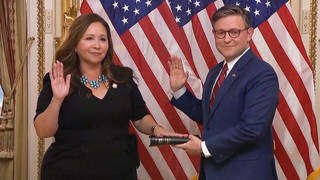
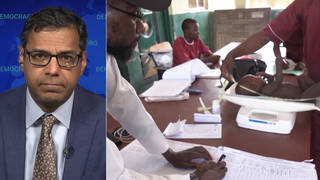
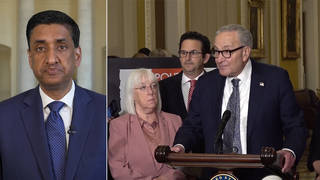





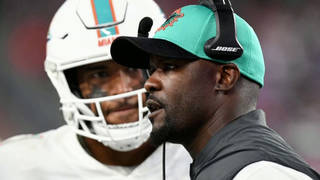
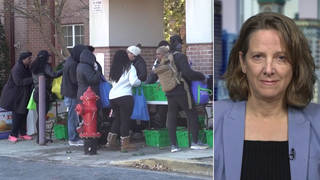
Media Options